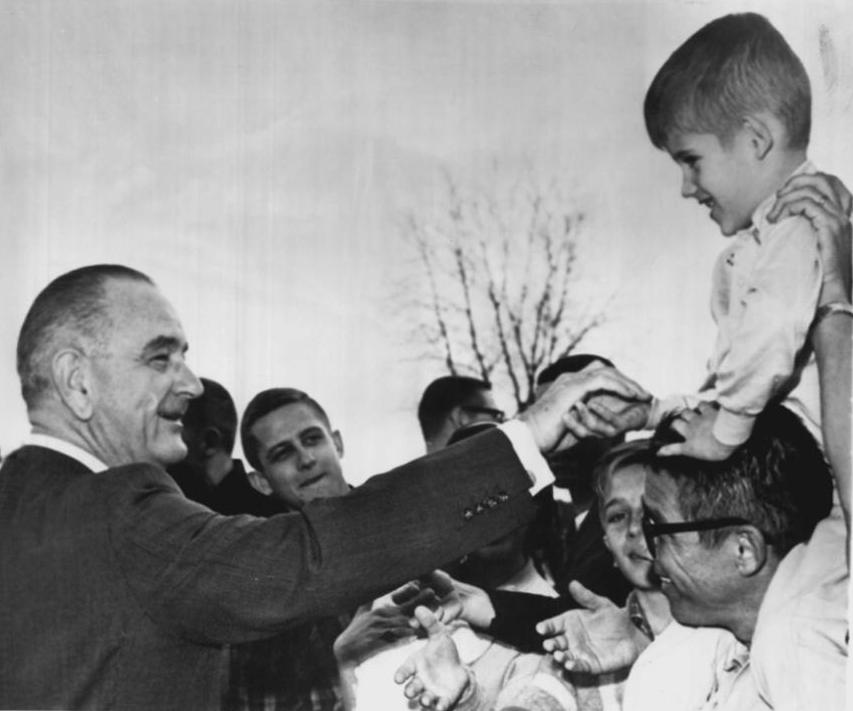
U.S. 1964 Presidential Elections: The New President

Figure 1.--This photograoh was taken in Austin just after New Years 1964. The caption read, "Boy meets president: President Lyndon B. Johnson reaches out to shake hands with a youngster perched on the sholders of his dad. A short while later, the president, Mrs. Johnson, and daughter Lucy boarded the presidential plane to return to Washington. The president and his family speb=nt the holidays at the LBJ ranchnear Johnson City Texas."
|
|
Vice-President Lyndon B. Johnson had come to office less than a year before the 1964 election as a result of the Kennedy Assaination. Johnson was a Washington power broker par excellence. He had come to Washington as a young Congressman and stanch supporter of President Roosevekt's New Deal (1936). After six terms in the House, Johnson was elected to the Senate in 1948. Johnson in 1953, he became the youngest Minority Leader in Senate history, and the following year, when the Democrats won control, Majority Leader. He was one of the most masterful if not the most masterful majority leaders in Senate history. He worked closely with aide Bobby Baker. With rare legislative skill he worked with the Eisenhower Administration to push through several important bipartisan measures. Senator Kennedy as a junior Senator played a minor role in the Senate during the 1950s. Translating his legislative skills into vote-winning support outside iof Texas proved difficult. He was unable to match Senator Kennedy's charisma and did not do well in the 1960 primaries. Accepting the vice-pressidency was thus a difficult decesion for Johnson and a major come down for the energetic Johnson. It is unlikely he could have ever won the Democratic nominmtion from his Senate power base. And Kennedy may not have won the election without Johnson. From the beginning there was tension between Jonson and the Kennedy people, especiallly the President'd brother Robert who had opposed offering him the vice-presidency. After the assassination of his predecessor, Johnson managed to successfully associate himself with Kennedy's popularity. And his public personaa was to pertend to stay out of politics.
President Kennedy's people were of course heartbroken. And there were problems, most did not like Johnson. Robert Kennedy, despite his personal dislike of Johnson, attempted to force the new president to accept him as his running mate. Kennedy found it was best not to ply politics with Johnson. The President avoided this threat by announcing that none of his cabinet members would be considered for the vice-presidential nomination. There wa, howevr, no immedate break with the new president. PresdentbJohnson continued the Kennedy legislative inititives and with his unique legislative skills probabky du=id btter abnd getting it passed than President Kennedy could have dine. The greatest priority was given to the Civil Rights legislation. The land-mark legislation would be enacted in the middle of the electiin campign (July 1964).
HBC

Navigate the Boys' Historical Clothing Web Site:
[Return to the Main U.S. 1964 election page]
[Return to the Main U.S. 20th century election page]
[Return to the Main U.S. election page]
[Return to the Main U.S. presidential page]
[Return to the Main U.S. political party page]
[Return to the Main U.S. history page]
[Introduction]
[Activities]
[Biographies]
[Children]
[Chronology]
[Clothing styles]
[Countries]
[Essays]
[Bibliographies]
[Contributions]
[FAQs]
[Glossaries]
[Images]
[Links]
[Registration]
[Tools]
[ Boys' Clothing Home]
Created: 2:11 AM 6/2/2012
Last edited: 2:11 AM 6/2/2012



